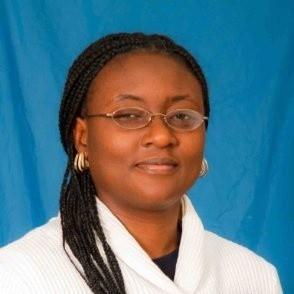
Alumni Spotlight: Mary Habila, '21

When Mary Habila, ’21, began volunteering at a local elementary school in Kentucky several years ago, she had no idea that it’d lead her to pursue an entirely new career path, let alone in Federal Way, Wash.
Habila worked in the tech world, eventually owning a small business before moving to the U.S. from Nigeria with her family in 2004. Wanting to gain a better insight into how the public school system worked so that she could better support her community, Habila took up mentoring and tutoring local students.
“While volunteering, I became really passionate about the holes and the cracks that I was seeing in the public school system and how minority students were easily falling through those holes and cracks,” Habila recalls. “That really broke my heart.”
Fast forward to 2022, today Habila is a school psychologist with Federal Way Public Schools (FWPS), providing support to teachers, staff, school administration, students and parents. She is primarily responsible for facilitating student evaluations for those who may have special needs, as well as providing individual and classroom interventions.
In her short time at FWPS, she has been praised by colleagues for the impact she’s having with diverse communities, especially immigrant families and students who are new to the South Sound.
EMPOWERING FAMILIES
After completing her degree in school psychology at Seattle University where she was a member of the National Honor Society, Habila was immediately tasked with facilitating student evaluations in her new role at FWPS in 2021.
“It was early on, maybe my first or second evaluation,” she recalls. “I was working with a family who were late in providing the required documentation needed to complete a student evaluation. When I reached out to the mother to get the documents, she responded that her husband handles paperwork because of her limited English.”
Unfortunately, the student’s father was out of the country—for six weeks. Knowing firsthand the severity of the student’s issues, Habila told the mother that she’d work with her directly to get the required paperwork completed for her son’s evaluation.
“It became clear that the issue wasn’t her English—it was her confidence,” says Habila. “I reassured that her English was good enough to complete the task and if she became confused at any point, I was willing and available to support her in completing the required paperwork. I encouraged her to ask questions freely. I empowered her. It was that simple.”
What came next is something that still brings a smile to Habila’s face today.
“After the meeting, the mother drove down to my school to say thank you. She told me that I gave her something she never knew she had—confidence.”
SEATTLE UNIVERSITY’S IMPACT
In addition to her supportive family, friends and colleagues, Habila credits her early success in school psychology and working with diverse communities to her experience at Seattle University.
“It gave me a very balanced view about life,” Habila says. “Not only did I learn about performing the job of school psychologist, like administering psychometric assessments, but Seattle U also gave me an opportunity to learn what social justice really means.”
She recalls the value of both the social justice coursework she completed at Seattle University and watching racial, social and economic injustice issues unfold in the community and throughout the country while she was a student.
“In addition to reading and learning about it in class, it was playing out right before me in real time. I realized that this is something I’m not going to run away from as I get into this field. It is something I need to stand for, speak for and be my best self in it. Seattle U empowered me to come out with confidence in confronting these issues.”
MOVING FORWARD
As she looks forward to continuing her work at FWPS, Habila believes there are plenty of challenges to tackle, especially as it relates to students transitioning to in-class instruction amid the pandemic.
According to Habila, many students, especially those requiring special attention and assistance, struggled with online instruction during the height of COVID-19, leading to poor attendance rates and performance. In turn, she and her colleagues grapple with the question of whether this is a result of a particular student’s disability or a lack of proper instruction.
“It’s a big puzzle that we’re still trying figure out,” she says. “In talking with colleagues from other school districts, it sounds like they’re facing a similar predicament.”
The issue stuck a chord with Habila so much so during the pandemic that she started an after-school program through her church called the Virtual Connection Club. The program sets up local mentors with students and provides guidance to parents on what resources are available if their children fall behind.
In addition to addressing these challenges, Habila hopes to be a role model for FWPS’ diverse student population.
“It makes a significant difference to students when the district’s administration, faculty and staff is as diverse as the student body, which hasn’t always been the case in Federal Way and many of our schools,” she says. “So, Federal Way School District and my volunteer work are the places where I’m making a tiny difference and hope that my influence will grow and not just stop with me.”